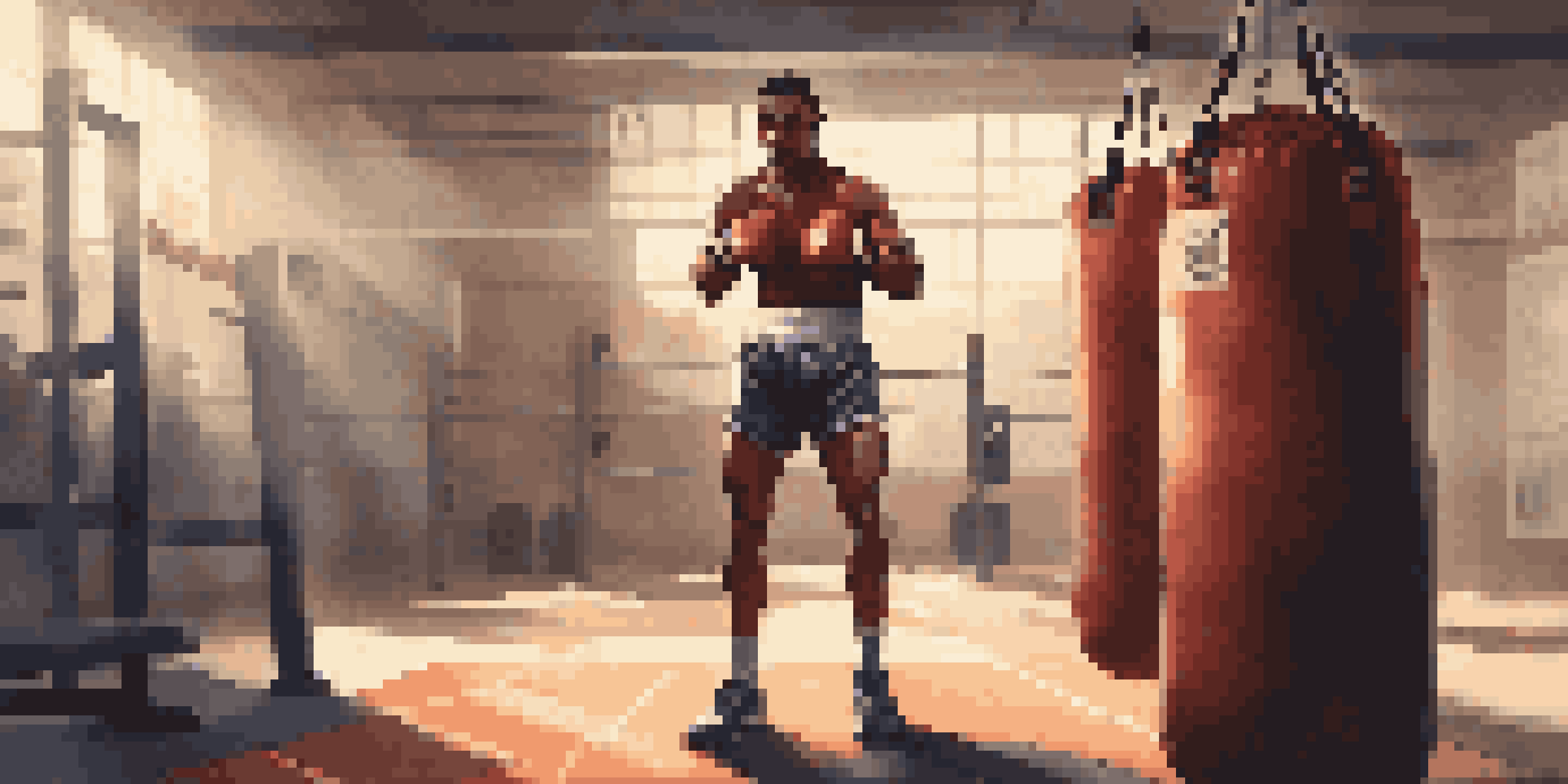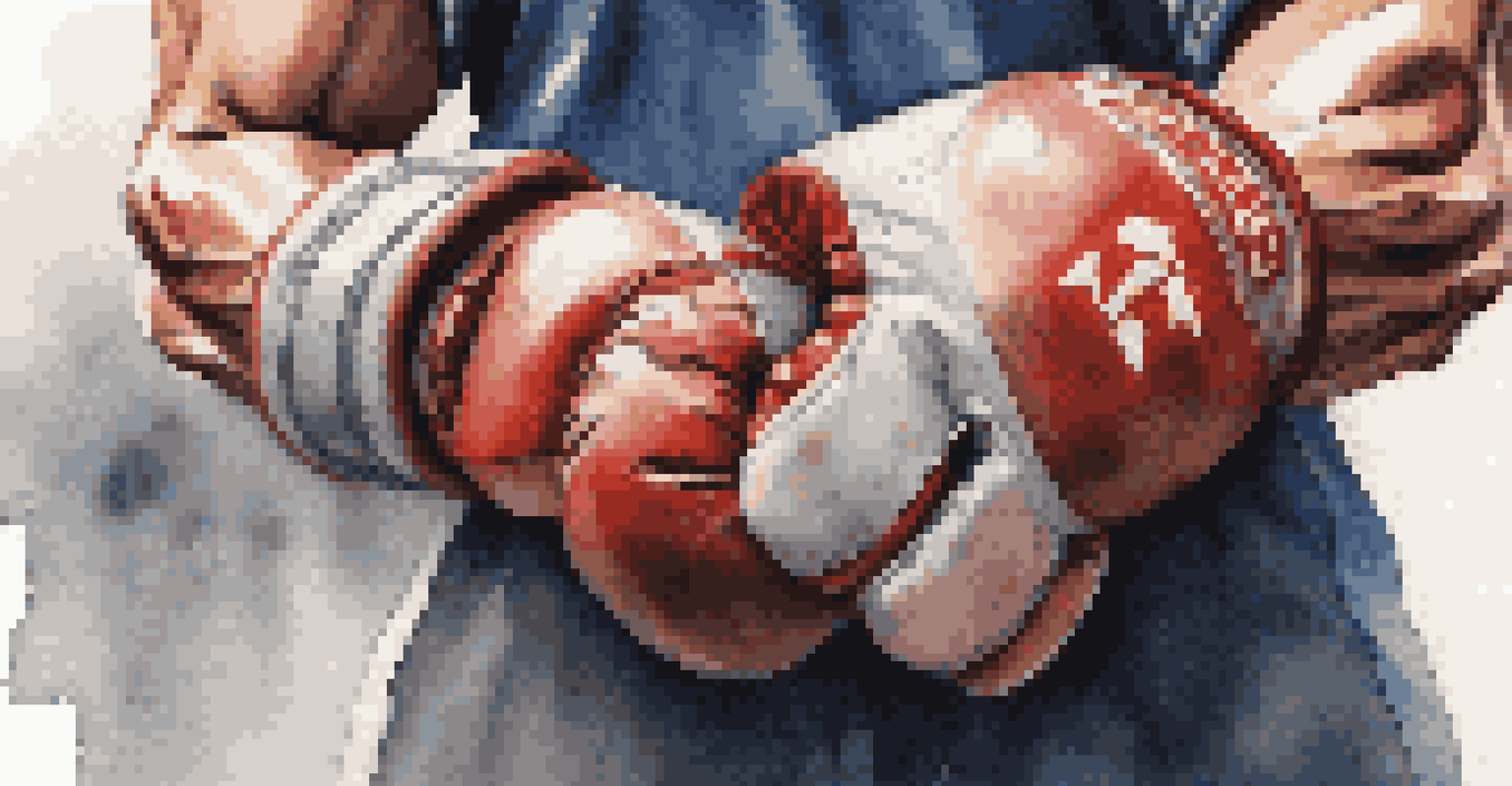Understanding the Mental Game in Combat Sports

The Importance of Mental Toughness in Combat Sports
Mental toughness is a cornerstone of success in combat sports. Fighters face not only physical challenges but also intense psychological pressures during training and competition. It's the ability to stay focused, composed, and resilient that often separates champions from the rest.
The greatest weapon against stress is our ability to choose one thought over another.
Consider a boxer stepping into the ring. The physical training is vital, but if their mind isn't prepared, all that hard work can go to waste. Mental toughness allows an athlete to overcome fear, doubt, and fatigue, ensuring they perform at their best when it matters most.
In essence, mental toughness is like a secret weapon. It empowers fighters to push through tough rounds, stay calm under pressure, and maintain their strategy, even when the stakes are highest.
The Role of Visualization Techniques
Visualization is a powerful mental tool used by many successful athletes. By imagining themselves successfully executing techniques or winning a fight, fighters can create a mental roadmap that boosts their confidence and prepares them for competition. This practice primes the brain for action.

For instance, a martial artist might visualize their movements before practice, mentally rehearsing each kick and punch. This not only enhances muscle memory but also reduces anxiety by familiarizing them with the scenarios they may face in the ring.
Mental Toughness is Key
Mental toughness empowers fighters to overcome psychological challenges, ensuring peak performance in high-pressure situations.
Incorporating visualization techniques into training can lead to improved performance. It’s like training the mind to respond positively to pressure, making a fighter feel more in control when it counts.
Handling Pressure and Performance Anxiety
Many athletes experience performance anxiety, especially in high-stakes situations. This pressure can be overwhelming, leading to self-doubt and fear of failure. Learning to manage this anxiety is crucial for success in combat sports.
It's not whether you get knocked down, it's whether you get up.
To combat pressure, fighters often use breathing techniques and mindfulness practices. By focusing on their breath and staying present, they can quiet their minds and reduce anxiety, allowing them to execute their strategies more effectively.
Ultimately, handling pressure is about building a strong mindset. With the right techniques, athletes can turn nerves into positive energy, transforming anxiety into a performance-enhancing tool.
The Power of Positive Self-Talk
Self-talk plays a significant role in shaping an athlete's mindset. Positive self-talk involves encouraging and motivating oneself, which can boost confidence and performance. This is especially important in combat sports, where self-doubt can creep in quickly.
For example, a wrestler may repeat affirmations like 'I am strong' or 'I can do this' before a match. By fostering a positive inner dialogue, they can counteract negative thoughts that might undermine their confidence.
Visualization Boosts Confidence
Utilizing visualization techniques helps athletes mentally prepare and enhances their confidence before competitions.
Incorporating positive self-talk into training routines can create a resilient mindset. It’s akin to having a personal coach in your head, cheering you on and pushing you to achieve your best.
Building Resilience Through Failure
Failure is a natural part of sports, but how athletes respond to it can define their careers. Resilience is about bouncing back from setbacks and learning from them, which is especially vital in combat sports where losses are common.
For instance, a fighter who loses a match can either dwell on the defeat or analyze what went wrong and improve. This ability to learn and adapt is what separates successful athletes from those who struggle to move forward.
Thus, embracing failure as a learning opportunity fosters resilience. It teaches fighters that setbacks are not the end, but rather a stepping stone to future success.
The Impact of Coaching on Mental Game
Coaches play a crucial role in developing the mental game of their athletes. A good coach not only trains physical skills but also fosters mental resilience. They provide guidance, support, and strategies tailored to each fighter's unique mindset.
For example, a coach might help a fighter create a mental checklist to follow during a match, ensuring they remain focused on their game plan. This kind of mental preparation can be as important as physical training.
Coaching Enhances Mental Resilience
Effective coaching not only develops physical skills but also strengthens an athlete's mental game through tailored support and strategies.
The relationship between a coach and athlete is integral to strengthening the mental game. With the right support, fighters can develop confidence and mental strategies that complement their physical abilities.
Mindfulness and Its Benefits in Combat Sports
Mindfulness practices, such as meditation and focused breathing, can greatly enhance an athlete's mental game. By training the mind to stay present, fighters can improve their concentration and emotional regulation during high-pressure situations.
For instance, dedicating a few minutes each day to mindfulness can help a fighter become more aware of their thoughts and emotions, reducing stress and anxiety. This heightened awareness allows them to respond better to in-the-ring situations.

Incorporating mindfulness into training routines can lead to improved focus and performance. It’s like sharpening a blade; a well-tuned mind cuts through distractions, allowing the athlete to perform at their peak.
Conclusion: The Mental Game as a Game Changer
In combat sports, the mental game is just as important as physical skill. Understanding and developing mental resilience, visualization, and self-talk can significantly enhance an athlete's performance. It’s a comprehensive approach that sees the fighter as a whole, not just their physical capabilities.
As the saying goes, 'Your mind can be your greatest ally or your greatest enemy.' By cultivating a strong mental game, fighters can ensure that their mindset supports their goals, rather than hindering them.
Ultimately, mastering the mental game can be a game changer, propelling athletes towards success. It’s about building a mindset that thrives under pressure, turning potential challenges into opportunities for growth.